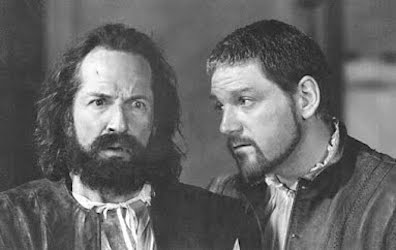Figure of speech. As William Brayden ascends the
stairs of the newspaper office, Bloom sees "Welts of flesh
behind on him. Fat folds of neck, fat, neck,
fat, neck." Clearly Joyce is practicing some artful
manipulation of language in the second sentence, but it is not
clear which rhetorical figure he may have had in mind. The
most likely candidate is epimone, the insistent
repetition of a word, phrase, or clause.
Epimone (eh-PIM-o-nee, from Greek epi- = upon +
meno = to remain, dwell) means "staying on" or
"dwelling on" the same word or words. A synonymous Latin term
is perseverantia, or persistence. The general idea
behind the rhetorical figure seems to be that when words or
phrases are insistently repeated they may begin to lodge in
listeners' heads and influence their opinions. Many a
demagogic politician will keep saying the same thing even when
it does not advance a sensible argument ,on the theory that
when people hear something over and over they will begin to
think there must be something to it. Shakespeare's Iago does
that when he repeatedly tells Roderigo, "Put but money in thy
purse." Brutus does the same thing in his funeral speech, and
Antony devastatingly turns the device back on him with his
increasingly ironic statement, "For Brutus is an honourable
man."
Richard Nordquist (thoughtco.com) quotes from Daniel Miller's
Rhetoric as an Art of Persuasion: From the Standpoint of a
Lawyer (1880) the view that epimone normally renders
words or thoughts "ridiculous," but that "This fallacy is
often resorted to by unscrupulous men during the excitement of
political contests, when some idea or point is assumed without
proof to the detriment and prejudice of a man or party; and
though it may have no just foundation for support, yet is
dwelt upon and commented on so frequently, that the ignorant
assume that the charge must be true, else it would not receive
so much consideration; they apply to the matter under
consideration the old adage: 'That where there is so much
smoke there must be some fire'."
All of this is coherent and interesting in the arena of
rhetorical persuasion, but it appears to have little to do
with Joyce's mind-numbing alternation of two words. He seems
instead to be evoking a kind of dull impersonality in the
obese editor of the Freeman's Journal as he lumbers
through the office and heads upstairs, step by heavy step: "It
passed statelily up the staircase, steered by an umbrella, a
solemn beardframed face. The broadcloth back ascended each
step: back. All his brains are in the nape of his neck,
Simon Dedalus says. Welts of flesh behind on him. Fat folds
of neck, fat, neck, fat, neck." The editor's heavy steps
are first evoked in the repetition of "back," and then in the
regularly alternated "fat" and "neck." This plodding
repetition perhaps achieves some of the "ridiculous" effect
mentioned by Miller.
Ancient rhetorical theory invented many terms for different
kinds of repetition, some of which might possibly challenge
epinome and perseverantia for ownership of Joyce's phrase. Gideon
Burton defines several: conduplicatio ("The repetition
of a word or words in adjacent phrases or clauses, either to
amplify the thought or to express emotion"), diacope
("Repetition of a word with one or more between, usually to
express deep feeling"), epizeuxis or palilogia
("Repetition of the same word, with none between, for
vehemence"), polyptoton or paregmenon ("A
general term for the repetition of a word or its cognates in a
short sentence"), and ploce ("A general term for the
repetition of a word for rhetorical emphasis"). Stuart Gilbert
sees "neck fat neck fat neck" as an example of anaphora.



